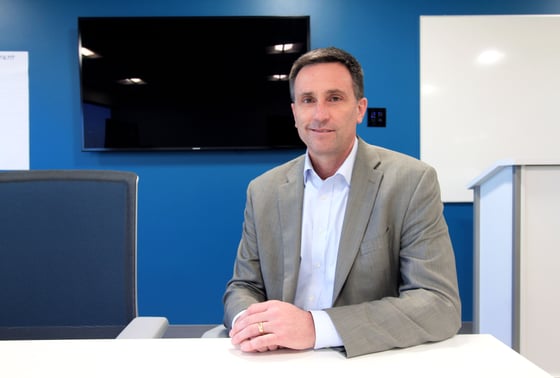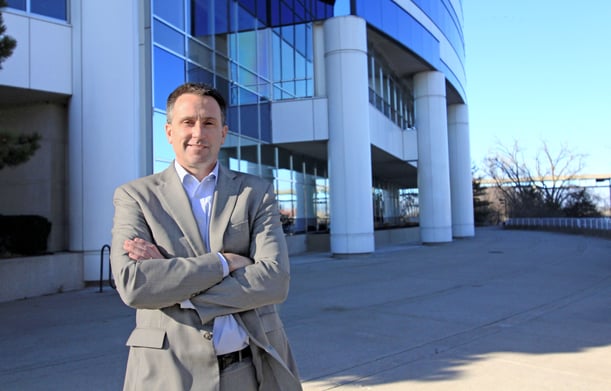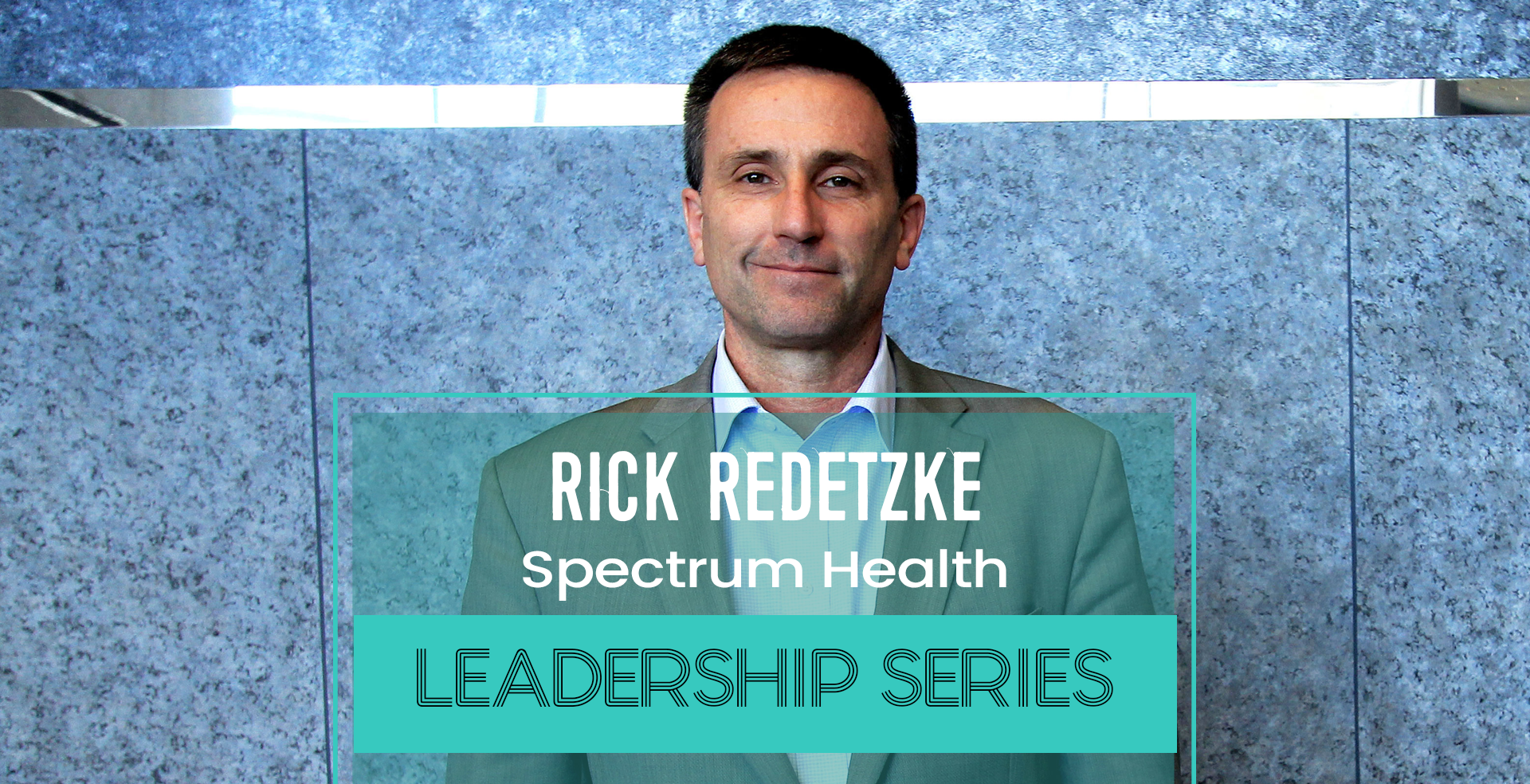The push toward consumerism is increasingly at the forefront of health systems’ strategic decision-making...and according to Rick Redetzke, this is what is most exciting about the direction care delivery is headed.
Redetzke serves as SVP, Facilities and Real Estate at Spectrum Health, a nonprofit, integrated health system in West Michigan that’s recently rolled out new offerings in the telemedicine and population health arena with this patient-centered focus in mind.
We spoke to Redetzke about these new advancements, the best advice he’s received in his career, and the reason telemedicine doesn’t necessarily mean fewer facilities...
What drew you to the field of healthcare facilities?
My dad is an excavator, so I grew up in a small family business of digging in the dirt, but always wanted to follow my construction aspirations with facilities. It grew from the idea of constructing any building to focusing on healthcare.
Some of that was spurred by my own need for healthcare over time and an understanding of the incredible impact that healthcare facilities can have. Most people in a hospital are going through life-changing events; quality and design truly matter. Facilities either improve that experience or add to the stress, and I love being a part of the mission to accomplish the former.
What is the greatest challenge you face in your role?
The biggest challenge would be capital planning and decisions around the use of capital and resources. Often facilities become the surrogate for a lot of important discussions about how we prioritize needs within the community. How do you go about effectively making decisions when everyone is coming to the table with so many priorities, yet we have limited capital, labor, and resources? Your strategy is where you spend your money and time, after all.
What are you working on at Spectrum that you're most excited about?
I’m pretty excited about an area of our security department; specifically, being extremely purposeful about how we’re training our clinical staff. We’ve got four full-time security officers dedicated to training for de-escalation and situational awareness. We have a robust program that our staff loves, that includes a lot of interactions and simulations.
How do you take a program with great content and properly train 25,000 employees?
We’ve really had to tailor the program and right-size the content to match the time and resources that are available. For instance, it’s not easy for a nurse who requires continuing education to schedule it on her own outside of work hours and pay for it. If we’re able to provide this education around safety at their convenience and at no charge to them, we can start to envision the scale of what we’re trying to achieve. That’s why we’re focusing on providing CEUs and CMEs for this training.
Last summer, Spectrum debuted the Strive center, which is a unique non-traditional setting that mixes wellness with primary care in downtown Grand Rapids. What was the driver behind opening Strive?
Strive is a membership model to provide better health instead of a focus on traditional healthcare, one that provides quick, easy access. It's a bit of an experiment for our organization to try a different care delivery model. The goal is to focus on being proactive and preventative, and provide care when people are healthy, rather than when they get sick.
Strive looks and functions differently than the typical medical office. The office and exam room is one; the provider comes out, greets the patient and brings them back to that multipurpose room. Appointments are scheduled to be longer as well.
It's exciting to partner with other health-oriented community partners, such as an organization that does acupuncture or yoga, which are traditionally seen as totally different experiences. We’re both trying to be nimble and promote each other, and see how the community embraces this.
Telehealth is an area that’s undoubtedly transforming care. Is Spectrum doing anything in this arena?
Yes, our MedNow program has really grown organically. We developed this tool ourselves and have had great adoption. This service is available 24/7, 365 days a year, and connects patients who are having minor problems, like a cold or pink eye, with a physician through a video visit or online message exchange.
 |
It hasn’t specifically impacted facilities too much; in fact, it's a double-edged sword from a facilities standpoint. The natural reaction is that if you’re successful with telehealth or virtual reality standpoint, you will need fewer facilities. In some respect, that's true.
But if you think about how many facilities you already have and where you have them, I'd say the opposite could be true. If your organization has a lot of success with telehealth, you could be drawing in market share that you didn't have. Not every episode of care is able to be handled via telemedicine. Ultimately, if a patient has a good experience, that relationship can grow into a visit with a care provider and therefore there’s an interaction with facilities. It’s so interesting to watch telehealth develop; it's definitely transformative.
It definitely is. We recently spoke with Penn Health about their partnership with Mercy Virtual Care and it’s amazing.
Yes, it is. What they've done is awesome in many respects and we’re in the process of evaluating the right solution for our system.
With everything that’s on your plate, how do you retain a big-picture vision?
It's tough, but it comes down to the team you have. My job is to understand what needs to happen in the organization and match it up to the expertise that different people on the team have. It's easy to want to jump in and put the fires out yourself but the longer you go in your career, the more you have to try and step back and make sure you have the right people in place. I guess aspirationally, the ideal is to have less small fires because you’re improving, but there’s always going to be something.
What outside industry do you believe healthcare could learn the most from?
That’s a great question. The default answer that most people may recite is hospitality or retail. To me, I don’t know what’s going to help healthcare the most because the business model is so unique. Frankly, when you think about what drives healthcare and what’s going to change it most, its chronic disease management and keeping people healthy instead of dealing with symptoms of sickness.
What business model does that?
It's going to be something different that provides transparency and uses technology, but somehow it’s got to get at the core of people being responsible for their own healthcare when it comes to things like smoking, drinking, exercise, nutrition, medication compliance, etc.
I think the world of technology is key along with taking ownership of your health. I’m dancing around your question but I honestly don’t know what other industry has a business model like us where people are so distant from the cost and it’s such a huge chunk of our economy.
Throughout your career, what is the greatest advice you've received?
This is outside healthcare, but I think it applies to business and life. When I played basketball in college, my coach asked the team what the score was every time we went into the locker room at half-time.
Of course, we knew if we were winning or losing, but the answer he was always looking for is, “The score is zero-zero coach.” Yes, at half-time there might be a certain score, but my coach was trying to get us to think about differently with the intent to just show up, work hard every day, and be consistent. And consistency and hard work in business are what ultimately lead to success.
Are there any quotes about leadership that you find to be particularly impactful?
I recently saw a quote on the bottom of someone’s email, and it really jumped out at me. The quote was, “Business is like life, it's all about how you make people feel. It's that easy and it's that hard.” If you replace “business” with healthcare, it applies so perfectly.
With the accelerated pace of change today, is there anything you’re nostalgic for from back when you were just beginning your career?
Being part of a team of very smart people is so rewarding and that’s what I’m surrounded by today, but it's challenging to gain everyone's input to ultimately get a great solution and get something built. Sometimes, meetings are exhausting and it takes far too long to implement solutions.

Even if you are 80 percent right, action toward an 80 percent-right solution is better than significantly delaying a decision many times. So I would say I get nostalgic about early in my career when I had one or two projects, and I knew what was going to get built; you have a tangible sense of gratification when you can touch the wall and know what you did. As your career goes on and you take different branches in different directions, you can feel distant from building those brick walls.
What's your favorite way to relax outside of work?
Golf, boating, and time at the lake with my family. We have a place in Wisconsin and it’s nice to relax, do water sports there, and spend quality time together.
What excites you most about the direction that healthcare is headed?
I’m most excited by the huge focus on consumerism. In the spirit of being customer-focused and the fact that we’re dealing with more significant competition, health organizations that aren’t appropriately fulfilling a customer’s needs won’t be successful long-term. That’s a positive development that will play out in how we design, operate and market our services; the patient experience and staff experience is the focus of the future.
In your opinion, how will changes in care delivery ultimately impact facilities of the future?
Technology will probably make the biggest impact on facilities. It's already dominant but trying to plan for spaces that are flexible and adaptable to accommodate technology is key. The other aspect of that is telemedicine. Are facilities going to be smaller and spread out for better access for low-acuity needs, or bigger and consolidated? The market is changing, so time will tell.
Know a noteworthy facilities exec that we should feature in the Leadership Series? Feel free to drop us a line at HealthSpaces@influencegrp.com.

Posted by
Collaborate with your Peers!
HealthSpaces is a community for people that plan, design, build and operate spaces where healthcare is delivered.
June 7-9, 2026 | Braselton, GA
Learn More




-4.png)
-Dec-09-2025-05-48-44-4379-PM.png)
-4.png)
-1.png)
-2.png)

Comments